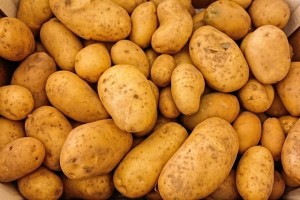potato ![]()
[noun]
[de aard-ap-pel, de aard-ap-pel-en/aard-ap-pels]
 “Aardappel” literally translates to “earth apple”. It’s actually a potato 🙂
“Aardappel” literally translates to “earth apple”. It’s actually a potato 🙂
“Aardappels” play an important role in Dutch cuisine, which is not too ambitious, but quite nutritious by intention. It is inspired by the Dutch fishing and farming history. Nowadays, Dutch cuisine has incorporated many foreign cuisines. For more info, check this article on Wikipedia.
“Aardappel” can also be used when you call somebody names. It’s a mild form of abusive language though 🙂
Examples:
– “Vanavond een lekker Hollands maal: aardappelen en bloemkool met een papje, heerlijk!”
(“Tonight a good Dutch dinner: potatoes and cauliflower with sauce, delicious!”)
– “Ik vind gekookte aardappels niet bijzonder lekker.”
(“I don’t find boiled potatoes particularly tasty.”)
– “Frank is een saaie aardappel, vind je niet?”
(“Frank is a bore head, don’t you think?” Lit.: “…a boring potato…”)
Expressions:
– “Met een hete aardappel in de mond praten / praten alsof je een hete aardappel in de mond hebt”: to speak/talk like a “kakker“: a stuck-up pompous, posh person. Also called “bekakt praten” in Dutch.
Related words:
– Aardappelmesje: little knife for peeling potatoes [noun] [het aardappelmesje, de aardappelmesjes].
– Aarde: earth, ground [noun] [de aarde, de aardes].
– Appel: apple [noun] [de appel, de appels/appelen].
Example:
– “Snoep verstandig, eet een appel!”
(Lit.: “Eat candy wisely, eat an apple!” Used to be a well-known Dutch slogan to promote the consumption of fruit. The verb “snoepen” is the act of eating sweets/candy or other sweet unhealthy food.)
– Dunschiller: (lit.: thin peeler) potato peeler [noun] [de dunschiller, de dunschillers]. Like in the picture!
– Keuken: kitchen [noun] [de keuken, de keukens].
– Koken: to cook, to boil, to prepare dinner [verb] [koken, kookte, h./i. gekookt].
– Schillen: to peel [verb] [schillen, schilde, h./i. geschild].

“Met een hete aardappel in de mond praten” – do you still refer to us poor English in this way?
So which plural form is correct? aardappels or aardappelen?
@ Neil
Both! Source: vandale.nl
@ Pete
Are the English known for talking with a hot potato in their mouth? I didn’t know! 🙂
Is there a similar expression in English?
@ Marc: if I may add my five pence worth?
The classic phrase that we would use is “speaks with a plum in his/her mouth”. A good modern-day exemplar of this style of speech is the art critic Brian Sewell. You may see an example of his fine work here: http://www.youtube.com/watch?v=u3G618-hxgA
A cold plum being less arduous on the salivary glands than a hot potato I suppose…:-)
Anyway, this style was formerly known as “received pronunciation” (RP), BBC English, or Oxford English and was particularly evident in British films of the 1930s to 1950s and practised by such luminaries as Noel Coward, Celia Johnson, Valerie Hobson, et al.
Curiously, nowadays this form of speech is almost seen as laughable I would say. Indeed, I have heard two Englishmen speaking fast described as “swallowing their words” by your countrymen. It seems as if English is a language that can also be spoken without moving the mouth much.
In order to seem more like the common man some UK politicians have developed a style in which letters or syllables are not clearly enunciated – the exact opposite of the plum in the mouth style.
Tony Blair, David Cameron and Ed Milliband all at times tend to drop the ‘t’ in words like “what” (“wha”). It’s interesting that what is seen as being desirable now is the opposite of what used to be aspired to.
Marc, obviously us Brits don’t like our potatoes too hot (ik denk nu aan hete hangijzers = hot potatoes!) because a posh person “speaks with a potato in his/her mouth”.
@Pete, my grandparents say very often that in order to be able to speak proper English you have to put a hot potato in your mouth. But I haven’t heard any other generations make this joke.
@Tom, it was just over thirty years ago that a Dutch girlfriend told me about it, so perhaps it is a generational thing.
@Marc, sorry for not replying to you sooner. Chris has provided the answer above – the “posh” English speak with a plum in their mouth.
“”Aardappel” can also be used when you call somebody names. It’s a mild form of abusive language though :-)”
None of my Dutch friends have ever heard of this. Care to elaborate who or where, or maybe when this is used?
I once heard somebody being called an “aardappelhoofd”, but in his case his head was in fact similar to a potato 🙂
While commenting I had to think of Vincent van Gogh’s painting of the “aardappeleters”: the “potato eaters”. Read more here in case you can’t get enough of the subject 🙂
http://en.wikipedia.org/wiki/Aardappeleters